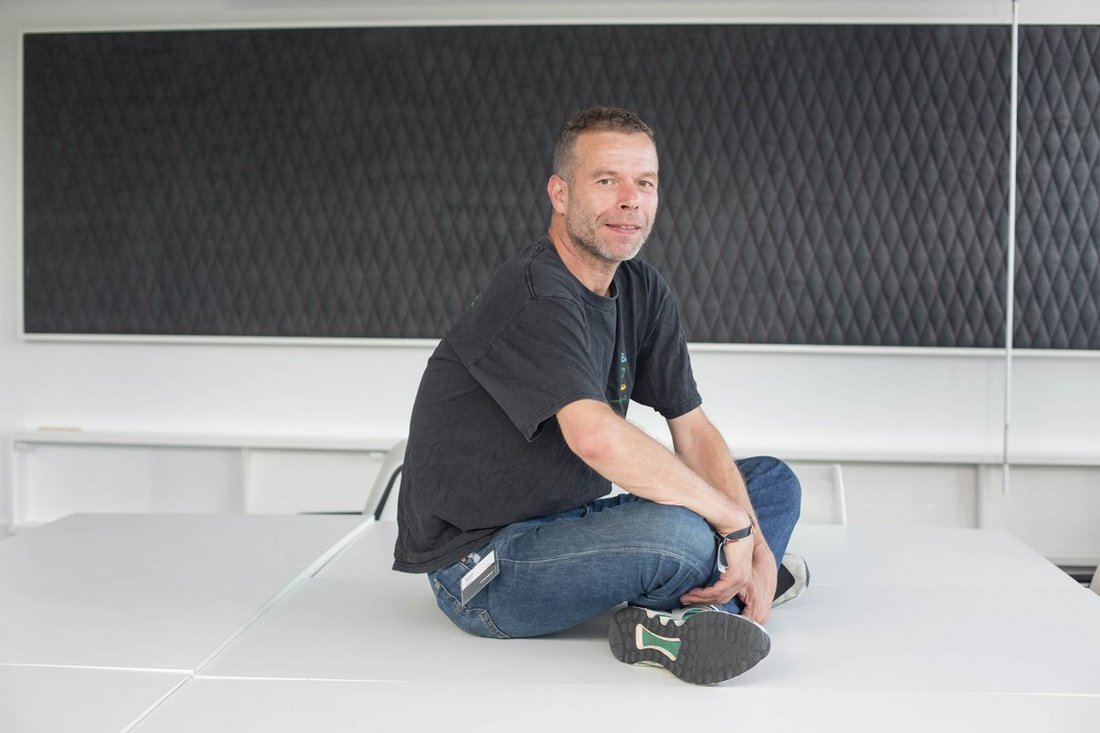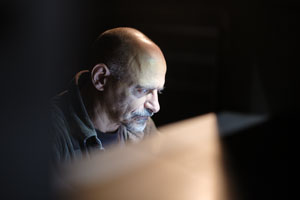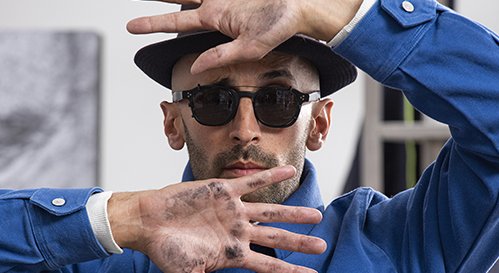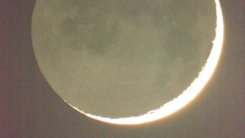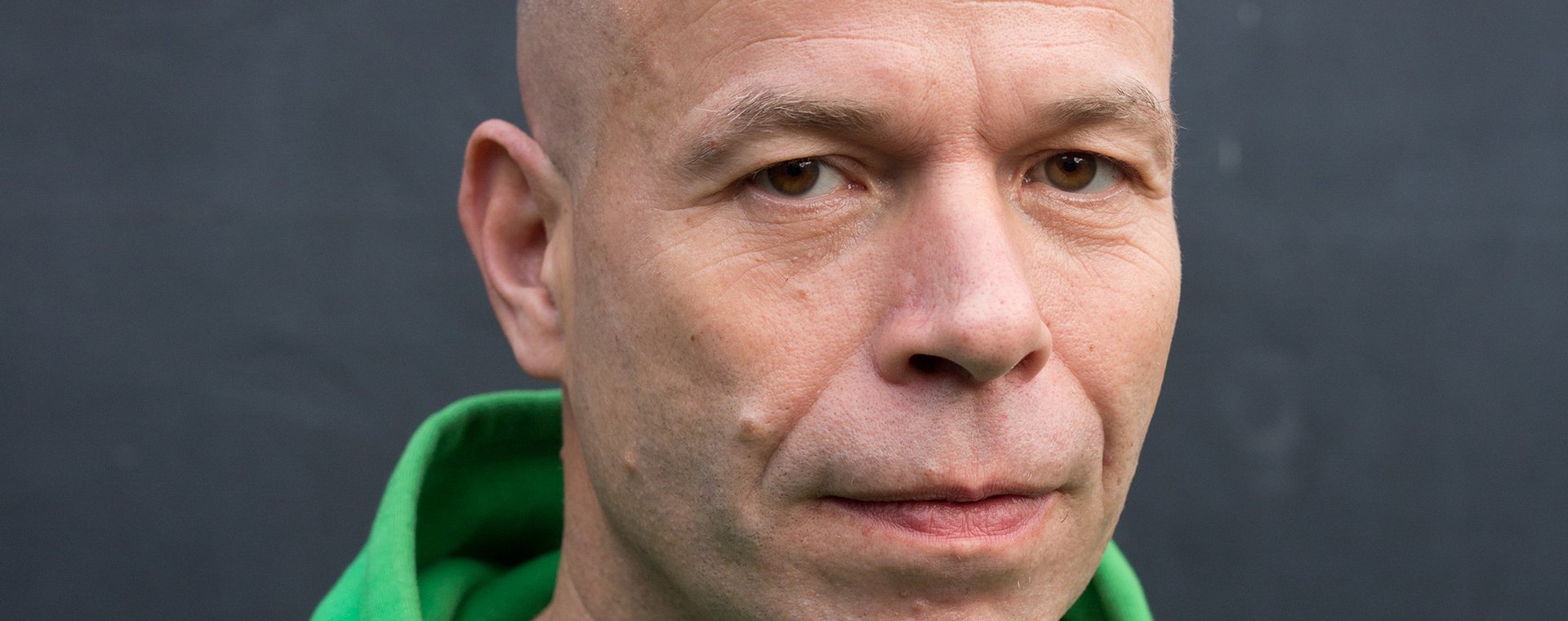
Wolfgang Tillmans: “I would like to tell a universal tale through my own personal story.”
W
olfgang Tillmans takes his time answering questions, as he seeks for the exact right words. His sentences, in impeccable English, flow and branch out through subordinate clauses that are reminiscent of his native German. As the only non-British artist to have won the prestigious Turner Prize (in 2000), he has been working for thirty years to deconstruct photographic genres, exploring still life as well as portraiture, not forgetting absolute abstraction.
Wolfgang Tillmans is a genuine reference for an entire generation of visual artists, and also a musician. In 2016, one of his pieces found its way onto Frank Ocean’s album Blond (a Tillmans photo also graced the sleeve). Then, in late 2021, he released an electro album in a highly personal, psychedelic vein, Moon in Earthlight. He has been an AIDS activist for many years and is also a fervent supporter of the European cause. He is often on the move; the eighth edition of his travelling exhibition, “Fragile”, was on display in 2022 in Lagos, Nigeria, after starting in Kinshasa in 2018 and visiting other cities across Africa. This was followed by a retrospective at MoMA in New York in late 2022.
In June 2025, Wolfgang Tillmans will be the Centre Pompidou’s special guest. At the same time as the historic Piano and Rogers building closes for its major makeover, he will be taking over the space that, until now, has housed the Bibliothèque Publique d’Information, for a major exhibition entitled “Nothing could have prepared us, Everything could have prepared us”, showcasing new installations, photography, and videos. Interview with a sensitive, discerning artist.
You have often been called a ‘photographer of intimacy’. You use Instagram, which has completely shaken up our notion of intimacy. Do you think there is any meaning left in this notion?
Wolfgang Tillmans — This is a far-reaching question! Generally speaking, I try to maintain an optimistic view of social media, even if, objectively, there is good reason to worry about what social platforms do to human emotions, how they influence our interactions with each other. The system of gratification that they induce (with likes) affects our brains, especially adolescents’ brains. I have friends whose children no longer want to travel. For my generation, travel was very important; we set off each summer to travel through Europe by train. Curiosity and the urge to experience things yourself seem to have waned amongst certain young people. Luckily, the human brain is also very adaptable.
It’s interesting that photography is now a key element for communicating with each other on social media. And yet, documenting everyday life, photographing everything, all the time, has never been what drives me.
Wolfgang Tillmans
It’s interesting that photography is now a key element for communicating with each other on social media. And yet, documenting everyday life, photographing everything, all the time, has never been what drives me. People talk about my work like some form of “visual private diary”, which is not quite right, but some labels stick. I use my experience as a starting point to craft a genuine story that others can relate to. My work seems accessible; others can identify with elements from their own life. Accepting your body, your sexuality: if it is presented in a free, direct way, that’s easy to understand, without any theatricals, it’s that much stronger. Talking about my life with a focus on myself is of no interest to me. I want to tell a universal tale through my own personal story.
Talking about my life with a focus on myself is of no interest to me. I want to tell a universal tale through my own personal story.
Wolfgang Tillmans
You were gearing up for a huge retrospective at MoMA, New York, in September, "To Look Without Fear". How do you go about selecting works spanning three decades?
Wolfgang Tillmans — I really don’t know how to answer this question. Looking back over my archives was an opportunity for some pictures to resurface and take on new meaning. Last year, at the Galerie Chantal Crousel in Paris, I showed three images from 1991–1992, which blended in perfectly with other, more recent pictures. At the age of twenty-three, I had no idea this would be a thing, and so much the better! There’s a kind of cross-pollination process that sparks a conversation with my work across the generations.
You have just brought out an album of electro music, Moon in Earthlight. What are your musical influences?
Wolfgang Tillmans — I was lucky to have grown up in the 1980s, a teeming decade! This was when electronic instruments suddenly became affordable: anyone could try their hand at sampling techniques. ‘Postmodernism’ was the aesthetic philosophy of the time—even if at the time I had no idea what that meant. Mixing styles and eras afforded us great freedom. Nowadays I think of myself more as a ‘modern’ artist … Street culture, pop music, and electro music, with groups like Soft Cell and New Order—all this has nurtured me. I was delighted when the Pet Shop Boys remixed the track “Insanely Alive” off my album. We have been friends for a good twenty years. If you had told sixteen-year-old me, a Pet Shop Boys fan living in a small town in Germany, that I would one day work with them, I would never have believed you!
I was lucky to have grown up in the 1980s, a teeming decade! ‘Postmodernism’ was the aesthetic philosophy of the time – even if at the time I had no idea what that meant.
Wolfgang Tillmans
How long have you been interested in music as an art form?
Wolfgang Tillmans — Ten or fifteen years ago, I started recording sounds that intrigued me—it was a way of rounding out my art, recording both sound and vision, as it were. Like photography but for sound. I recorded things like the press printing my books. This was actually the inspiration for my first song, “Make It Up As You Go Along”. I work in various musical forms, the spoken word, electro with my friend Tim Knapp, and also in group format with various collaborators. This album is perhaps what comes closest to my visual art, in its variations and its various levels of production, from the most rough’n’ready to the most sophisticated.
You are a committed European. How are you coping with these troubled times?
Wolfgang Tillmans — European unity in the face of war in Ukraine is remarkable and praiseworthy, but isn’t it the least we could expect? What does shock me, is that some politicians, in Hungary and even in France, think it’s okay to cosy up to the Russian regime. The big problem with Europe, with the EU model, is that we tend to take things for granted. When we have freedom of speech, living in a democracy, we get used to it, and we no longer can even imagine having to defend our fundamental rights. Over the past thirty years, we have assumed, wrongly, that there was a global consensus regarding freedom, rule of law, and civic rights. The harsh reality is that social progress, from votes for women through to abortion rights, not forgetting LGBT+ rights, the end of colonialism and the fight against racism, is not actually a universal aim. Even in our own societies, there are people who want to preserve the patriarchy. We are living in dark times, yet we must not give up hope. Our elders fought for their freedom, and we inherited that freedom; we need to continue the fight.
Contrary to Berlin’s reputation as a perfect place to party, I find that it’s an ideal place to work; it’s very peaceful, much quieter than other huge metropoles.
Wolfgang Tillmans
Your studio is in Berlin. How would you describe the atmosphere of this buzzing city?
Wolfgang Tillmans — I was born in Germany [in Remscheid, near Düsseldorf, in 1968] but left to study in the UK at the age of twenty-two. Ever since I first started out, I have often been associated with London culture. I left Germany just two weeks before Reunification, in October 1990. Yet I have always maintained strong ties with Berlin, and, ten years ago, I moved my studio from London to Berlin, in the Kreuzberg district. Contrary to Berlin’s reputation as a perfect place to party, I find that it’s an ideal place to work; it’s very peaceful, much quieter than other huge metropoles. Berlin was not all that expensive, but unfortunately over the past ten years, the appetite of global property investors has pushed prices up and it’s difficult to move here now. However, Berlin is still a welcoming city for artists. ◼
* Interview realised in mai 2022, on the occasion of the event "Mon Berlin"
Related articles
In the calendar
Portrait of Wolfgang Tillmans
Photo © Michael Amstad
